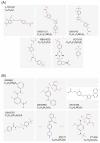The Role of PPARs in Breast Cancer
- PMID: 36611922
- PMCID: PMC9818187
- DOI: 10.3390/cells12010130
The Role of PPARs in Breast Cancer
Abstract
Breast cancer is a malignant tumor with high morbidity and lethality. Its pathogenesis is related to the abnormal expression of many genes. The peroxisome proliferator-activated receptors (PPARs) are a class of ligand-dependent transcription factors in the nuclear receptor superfamily. They can regulate the transcription of a large number of target genes, which are involved in life activities such as cell proliferation, differentiation, metabolism, and apoptosis, and regulate physiological processes such as glucose metabolism, lipid metabolism, inflammation, and wound healing. Further, the changes in its expression are associated with various diseases, including breast cancer. The experimental reports related to "PPAR" and "breast cancer" were retrieved from PubMed since the discovery of PPARs and summarized in this paper. This review (1) analyzed the roles and potential molecular mechanisms of non-coordinated and ligand-activated subtypes of PPARs in breast cancer progression; (2) discussed the correlations between PPARs and estrogen receptors (ERs) as the nuclear receptor superfamily; and (3) investigated the interaction between PPARs and key regulators in several signaling pathways. As a result, this paper identifies PPARs as targets for breast cancer prevention and treatment in order to provide more evidence for the synthesis of new drugs targeting PPARs or the search for new drug combination treatments.
Keywords: ERs; PPARs; breast cancer; ligands.
Conflict of interest statement
The authors declare no conflict of interest.
Figures






Similar articles
-
Peroxisome proliferator-activated receptors (PPARs) and the human skin: importance of PPARs in skin physiology and dermatologic diseases.Am J Clin Dermatol. 2008;9(1):15-31. doi: 10.2165/00128071-200809010-00002. Am J Clin Dermatol. 2008. PMID: 18092840 Review.
-
Peroxisome proliferators and peroxisome proliferator activated receptors (PPARs) as regulators of lipid metabolism.Biochimie. 1997 Feb-Mar;79(2-3):81-94. doi: 10.1016/s0300-9084(97)81496-4. Biochimie. 1997. PMID: 9209701 Review.
-
Control of peroxisome proliferator-activated receptor fate by the ubiquitinproteasome system.J Recept Signal Transduct Res. 2006;26(5-6):679-92. doi: 10.1080/10799890600928202. J Recept Signal Transduct Res. 2006. PMID: 17118805 Review.
-
Present concepts and future outlook: function of peroxisome proliferator-activated receptors (PPARs) for pathogenesis, progression, and therapy of cancer.J Cell Physiol. 2007 Jul;212(1):1-12. doi: 10.1002/jcp.20998. J Cell Physiol. 2007. PMID: 17443682 Review.
-
Peroxisome proliferator-activated receptors as therapeutic target for cancer.J Cell Mol Med. 2024 Mar;28(5):e17931. doi: 10.1111/jcmm.17931. Epub 2023 Sep 12. J Cell Mol Med. 2024. PMID: 37700501 Free PMC article. Review.
Cited by
-
Visualization of breast cancer-related protein synthesis from the perspective of bibliometric analysis.Eur J Med Res. 2023 Oct 27;28(1):461. doi: 10.1186/s40001-023-01364-4. Eur J Med Res. 2023. PMID: 37885035 Free PMC article.
-
Pioglitazone enhances cisplatin's impact on triple-negative breast cancer: Role of PPARγ in cell apoptosis.Saudi Pharm J. 2024 May;32(5):102059. doi: 10.1016/j.jsps.2024.102059. Epub 2024 Apr 1. Saudi Pharm J. 2024. PMID: 38601974 Free PMC article.
-
Clinical Relevance and Drug Modulation of PPAR Signaling Pathway in Triple-Negative Breast Cancer: A Comprehensive Analysis.PPAR Res. 2024 Dec 21;2024:4164906. doi: 10.1155/ppar/4164906. eCollection 2024. PPAR Res. 2024. PMID: 39735727 Free PMC article.
-
Epigenetic regulation of HOXA2 expression affects tumor progression and predicts breast cancer patient survival.Cell Death Differ. 2025 Apr;32(4):730-744. doi: 10.1038/s41418-024-01430-2. Epub 2025 Jan 20. Cell Death Differ. 2025. PMID: 39833374 Free PMC article.
-
Missense mutations of GPER1 in breast invasive carcinoma: Exploring gene expression, signal transduction and immune cell infiltration with insights from cellular pharmacology.Biomed Rep. 2024 Nov 29;22(2):22. doi: 10.3892/br.2024.1900. eCollection 2025 Feb. Biomed Rep. 2024. PMID: 39720300 Free PMC article.
References
-
- Sorlie T., Tibshirani R., Parker J., Hastie T., Marron J.S., Nobel A., Deng S., Johnsen H., Pesich R., Geisler S., et al. Repeated observation of breast tumor subtypes in independent gene expression data sets. Proc. Natl. Acad. Sci. USA. 2003;100:8418–8423. doi: 10.1073/pnas.0932692100. - DOI - PMC - PubMed
Publication types
MeSH terms
Substances
LinkOut - more resources
Full Text Sources
Medical
Research Materials

